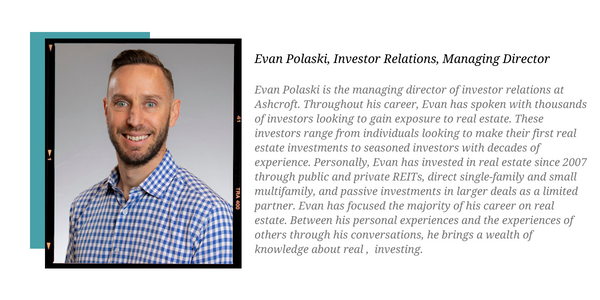July 12, 2023
By: Evan Polaski, Investor Relations Managing Director
The U.S. is in a recession by traditional definitions: depending on your source, several months or two consecutive quarters of economic slowdown. However, we continue to see strong employment rates, where recessions often carry an increase in job losses and unemployment.
But whether we are in a recession or just a period of strong economic uncertainty, the question remains: What should I do with my investment money?
Specific to real estate and multifamily, the industry I have spent my entire career in, we are seeing shifting fundamentals across the country. The COVID-19 pandemic pushed people to want more space. Additionally, low interest rates made housing more affordable for many, given the lower monthly payments of a mortgage.
Now, with interest rates up, there are fewer buyers. With rents skyrocketing over the last 18 months, more renters are considering roommates.
With these broader economic risks and the shift in real estate, herein lies the catch-22…if you invest now, you are accepting more perceived risk than in an era of economic expansion, and yet the outlook on many investment returns is lower than can be assumed in stronger economies. Investing 101 states that more risk should yield higher returns, but that is not necessarily the case in uncertain times.
I am not a financial advisor, and so this information is purely my opinion on the subject.
When looking at making a real estate investment, I find when balancing many different factors, it all boils down to taking on or mitigating risks, including choosing to either sit on cash or invest. Here are some of the ways I view my personal investments today.
Sitting on Cash
As inflation continues to erode the value of your cash, we never see a major drop in real estate values to offset the erosion.
That said, many real estate fundamentals remain strong. As noted, we have not seen major declines in overall employment. If residents are employed, they continue to pay rent. Many industries are seeing continued strong outlooks, meaning those employees remain confident in the long-term outlook and have been shown to continue spending money, keeping retail earnings healthier than other recessions. This keeps office spaces occupied and business travel strong, thus supporting hotel business. With interest rates as high as they are, on top of significant material and labor prices, development pipelines have slowed to a near stop, meaning the continued high demand has no new supply to expand into. From here, Econ 101 takes over: Demand that’s higher than supply means higher prices on existing products. When office, retail, industrial, and apartment rents stay strong, along with RevPAR in hotels, values will remain high, and very few distressed assets will enter the market to start affecting prices.
Investing Now
The risk of investing now is the inverse of the above. While spending has remained strong, what if the tipping point is just around the corner? Lower spending means lower sales, which means job cuts and businesses cutting other expenses, too. Conservative operators are assuming this slowdown will come. Rent growth will slow, and occupancy will increase. Because of this, many operators are underwriting lower overall returns than may have been projected 12–24 months ago. Finance 101 states that you should be compensated for your risk, so risks that feel higher with return projections that are lower, don’t make sense.
Of course, no one has a crystal ball. We can listen to industry experts, but even those vary in their opinions of the future. Some will be right, and others will be wrong. For my personal portfolio, I am still investing, but at a slower pace. Basically, I am hedging. I don’t want all of my capital sitting idle waiting for a cliff that never comes. And I don’t want to sink all my eggs into an investment that may struggle along. This is the basic portfolio theory of dollar-cost averaging. While this is typically applied to buying stock over time, I view it the same way with real estate investments. I am looking to continually place capital both in periods of strong optimism and fear.
The benefit of this strategy, given the illiquid nature of real estate, is that it also helps create investment laddering, or having a steady stream of investments placed over time. This limits the likelihood of having a major capital event taking all my capital out at once, and introducing reinvestment risk on my entire pool of capital.
Lastly, I always take the Warren Buffett approach: Only invest in things you know and understand. Thankfully, there is a magnitude of educational content available to help you learn about any area of investing. And I never invest more than I can lose. With my real estate investments, that means asset classes I understand, operators I trust, and time to look into the details of their investments. How are they mitigating risks? How do their assumptions compare to current market conditions and long-term average market conditions? How did they perform during prior recessions?
Consider Focusing on the Long-term
If you choose to invest now even though we’re in a recession, you should first focus on the long-term. Real estate is a long-term investment that you’ll continue holding well past a recession, which is why it’s difficult to state that there’s a bad time to invest in real estate.
Because of the lack of supply that was mentioned above, prices of existing properties shouldn’t drop too much. Attempting to time a real estate investment is next to impossible, meaning it’s best to invest now if you have the funds to do so. Taking a long-term approach to your investments means that the current market conditions shouldn’t weigh significantly on your decision.
Understand Your Financial Situation
You should have a thorough understanding of your own financial situation. Do you have a high-risk tolerance? If so, there isn’t much stopping you from making additional investments during a recession. The time horizon for real estate is long, which effectively reduces your risk. [1]
In the event that your financials are strong, sitting on capital may result in its value dropping before you invest it. There are a few factors that I consider when assessing how durable my current financial situation is, for example, the balance in my emergency savings. If it’s lower than ideal, I think about building up my assets before choosing to invest more during a recession. On the other hand, having a large amount of emergency savings makes it easier for me to justify this type of investment.
I also assess how much of debt is high-cost debt. If you’re currently paying a high interest rate on credit card debt that would exceed your earnings from a specific investment, paying off some of this debt may be more beneficial than investing during a recession.
Last, I always consider my short-term needs. If you have numerous short-term expenses that you expect to pay over the next few years, investing might not be the best idea. However, the existence of a recession shouldn’t be the sole reason that you avoid putting your money into real estate if your financial situation is otherwise strong.
Take Steps to Reduce Your Risk During a Recession
Diversification in real estate means adding some properties to your portfolio that don’t carry much risk. For instance, multifamily investing is an investment that will likely generate consistent returns on a long-term basis depending on the syndicator. These gains may offset some losses from other assets in times of economic downturns. Real estate investment trusts (REITs) are also another option for real estate investment portfolio. [2], [3]
It’s always good to have a strategy that aligns with your investment goals. For example, making sound real estate investments that are estimated to provide good cash flow and paying attention to your loan options and interest rates. indicate that interest rates tend to drop during a recession when the Federal Reserve makes adjustments to their rate policy. Waiting just a few months after the beginning of a recession may Historical trends Research indicates that interest rates tend to drop during a recession when the Federal Reserve adjusts their rate policy. Waiting just a few months after the beginning of a recession may lead to better financing. [4]
Sitting on idle capital has rarely proven to be a sound strategy, and those that try to time the market are often unsuccessful. However, being smart with your investments will continue to set you up for a better future.
To learn more about investing in multifamily apartments or for IRR and cash-on-cash projections, visit https://info.ashcroftcapital.com/fund or schedule a call with our Investor Relations Team at investorrelations@ashcroftcapital.com.
Sources:
- Chen, J. (2022, October 29). Investment time horizon: Definition and role in investing. Investopedia. https://www.investopedia.com/terms/t/timehorizon.asp
- Berger, R. (2022, November 15). How diversification works, and why you need it. Forbes. https://www.forbes.com/advisor/investing/what-is-diversification
- CFA, P. A. E. (2023, April 3). Diversifying your real estate investment portfolio. 1031 Crowdfunding. https://www.1031crowdfunding.com/diversifying-your-real-estate-investment-portfolio
- A., Rosenberg, E., & Due.com (2023, April 6). Do interest rates go down in a recession? Nasdaq. https://www.nasdaq.com/articles/do-interest-rates-go-down-in-a-recession



